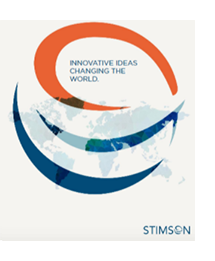PROFESSOR GROOME PRESENTS VICTIM DRIVEN INTERNATIONAL JUSTICE TO THE STIMSON CENTER
January 2021 — Professor Dermot Groome was invited to present his research to the Atrocity Study Prevention Group of the Stimson Center, a nonprofit, non-partisan think tank devoted to international peace and security. Groome presented Victim Driven International Justice (VDIJ), his idea for an alternative justice mechanism that uncouples justice for the victims of serious international crimes from the geo-political forces that dictate whether the international community supports international justice in a particular instance.
 Recognizing the complacency of the international community towards international crimes committed in places like Syria and Myanmar, Professor Groome has been developing an alternative justice mechanism he calls Victim Driven International Justice (VDIJ). On January 14, 2021, he presented his idea to the Atrocity Study Prevention Group of the Stimson Center, a Washington D.C. think tank that for 30 years has been developing strategies for urgent global issues. The Center is named for Henry L. Stimson, the American statesman, Secretary of State and Secretary of War during WWII who was one of the proponents of the Nuremburg Trials (incidentally, the New York State Bar Association awarded Groome the Henry Stimson and Elihu Root Award for Public Service) VDIJ uncouples victims’ quest for justice from the international community’s support (or lack of support) for justice addressing their victimization. VDIJ seeks to create a synergy between three legal concepts: The Right to Truth, Universal Jurisdiction and Private Prosecution. A summary of the idea can be found here.
Recognizing the complacency of the international community towards international crimes committed in places like Syria and Myanmar, Professor Groome has been developing an alternative justice mechanism he calls Victim Driven International Justice (VDIJ). On January 14, 2021, he presented his idea to the Atrocity Study Prevention Group of the Stimson Center, a Washington D.C. think tank that for 30 years has been developing strategies for urgent global issues. The Center is named for Henry L. Stimson, the American statesman, Secretary of State and Secretary of War during WWII who was one of the proponents of the Nuremburg Trials (incidentally, the New York State Bar Association awarded Groome the Henry Stimson and Elihu Root Award for Public Service) VDIJ uncouples victims’ quest for justice from the international community’s support (or lack of support) for justice addressing their victimization. VDIJ seeks to create a synergy between three legal concepts: The Right to Truth, Universal Jurisdiction and Private Prosecution. A summary of the idea can be found here.
Professor Dermot Groome is a Professor of Law and the Harvey A. Feldman Distinguished Faculty Scholar at Penn State Dickinson Law. Much of his teaching, scholarship, and service focus on emerging areas of human rights and international criminal law and draw upon his deep expertise and experiences. After starting his career in the Manhattan District Attorney’s Office where he was a member of the Sex Crimes Unit and after working in Jamaica, W.I. on issues of community development, human rights, and children’s rights, Professor Groome worked in Cambodia. While in Cambodia, he served as a Legal Advisor to the International Human Rights Law Group, helped lead an investigation into a 1997 attack on peaceful protestors and drafted a report for the UN Security Council, helped the Cambodia Defender’s Project and Legal Aid of Cambodia investigate deaths in police custody, worked on issues related to the incarceration of children, and wrote a draft juvenile criminal procedure code. Professor Groome subsequently spent over 11 years as a senior war crimes prosecutor at the International Criminal Tribunal for the former Yugoslavia. He investigated and drafted the first genocide indictment against a sitting head of state, Slobodan Milošević, and was the Senior Trial Attorney for the Bosnia indictment. In total, Groome led the prosecution of five international criminal trials including the case against Ratko Mladić, who was convicted of genocide for the murder of over 7,000 men and boys in Srebrenica in 1995. He led eight large complex international investigations of senior military, political, and police officials. Groome’s cases all included crimes of sexual violence against women, men, and children. He was instrumental in the development of Joint Criminal Enterprise, a theory of criminal responsibility often used to assess the culpability of senior officials for the crimes committed by their subordinates. Two documentaries have been made about Professor Groome’s cases: The Trial of Ratko Mladić (PBS/Frontline 2019) and Crimes Before the ICTY: Višegrad (UN TV 2017).